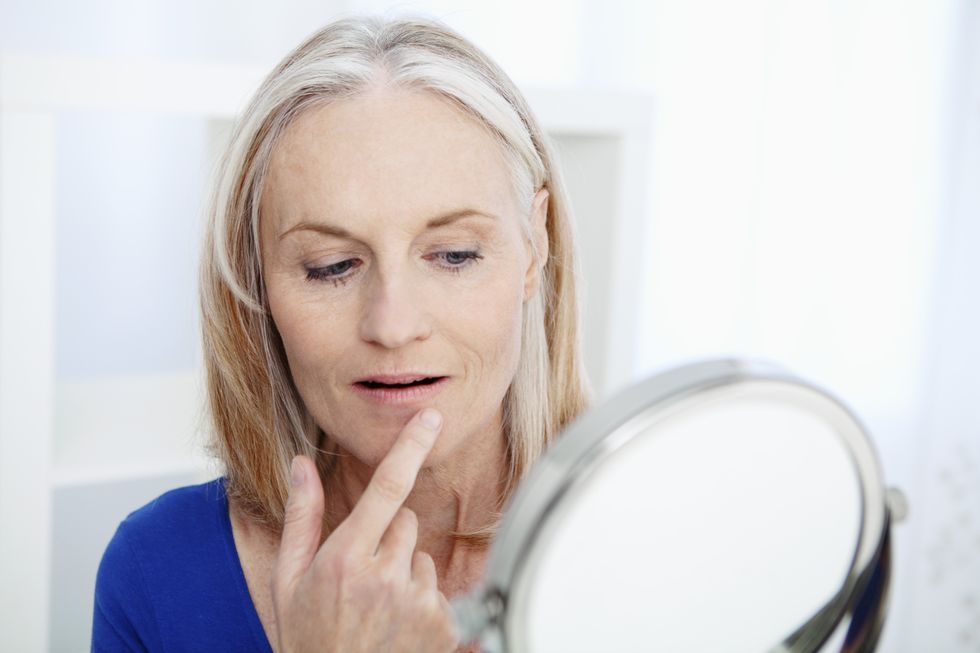Don't Miss
Most Read
Trending on GB News
Cortisol levels can change based on a number of factors and an expert shared how exercise is a "particularly good" way to combat too much cortisol during menopause.
While no one amount is ideal, an expert explained how it can contribute to early ageing and the best ways to regulate this.
What is cortisol?
Dr Aarthi Sinha from Church Crescent Aesthetics spoke about the hormone. She said: "Cortisol is produced by the adrenal gland and is a stress hormone. It will increase your energy levels and it will increase your sugar levels – it’s the fight or flight response hormone.
"Cortisol levels completely fluctuate during the day and also during the night, depending on what your sleep is like and if you're sleeping properly.

Too much cortisol can cause ageing
GETTY
"Have you exercised? Have you had a relaxed day? Have you been busy at work? When you've been really busy, you might find it hard to unwind at the end of the day because your cortisol levels are quite high.
"There is no one particular level or amount of cortisol that is ideal. It's more about the variation and the pattern that’s unique to you, and the effects that it has on you.
"If you have too much cortisol, you can also have a high sugar level, putting you at an increased risk of diabetes, high blood pressure, as well as increased weight. You can get cushingoid features – an accumulation of fat around the tummy, often with purple stretch marks on the skin, and a thick neck. That can be a good indicator that you have excess cortisol."
How does it affect ageing?
Having excess cortisol can correlate with stress and ageing, as it can cause collagen and elastin to break down in the skin. In fact, a stressful lifestyle can make people look around 3.5 years older, according to one study. Dr Sinha explained this further.
She continued: "They say stress ages you and cortisol is one of the main culprits. If your cortisol is high or dysregulated over a long period of time, it affects how much blood flow is going to the skin.
"This will cause your collagen and elastin to breakdown - and without a regulated blood supply your hormones can’t build up your collagen and elastin meaning your skin will look tired and unhealthy, becoming saggy and lax."
Menopausal women are also more likely to have dysregulated levels of cortisol, leading to sleep problems and weight issues as "typically, menopausal women say they can't shift the weight like they used to - a lot of that is cortisol".
It can also get in the way of the results of anti-ageing treatments, according to the expert. She added: "With regards to skin care - you might be using all the anti-ageing serums and creams on your skin, perhaps even having tweakments too like Botox, Profhilo and fillers – but if your cortisol levels are high, it will be degraded your efforts from the inside."
So, what can you do?
There are some ways to best regulate cortisol levels which include simple lifestyle improvements and regular exercise could be one of the most effective ways to do this.
LATEST DEVELOPMENTS

Dr Aarthi Sinha shared her advice
Dr Aarthi Sinha
The expert explained: "You can help your cortisol levels during menopause with holistic lifestyle changes – diet, sleep, exercise etc. Exercise is particularly good for regulating your cortisol levels.
"In my practice, I usually divide a treatment plan for my patients into two - looking at the skin on the outside and also how we are going to treat the patient on the inside.
"The inside always comes first. I look at where a patient is in their life and if they're ready for change because that's the main thing. We'll look at diet, exercise, their job. Do they need any adaptations or adjustments at work? We look at their sleep, how many kids they have and what they are doing. What time are they sleeping and waking up?
"How much water are they drinking and how is their diet? – looking at macronutrients and micronutrients. As well as looking at their microbiome – which can affect your skin, but also your health.
"We look at a patient truly holistically and make a plan together. It's written down and targets are set, but not set in stone. Ultimately the plan will help to settle down and regulate the cortisol levels.
"Then I turn my attention to the skin on the outside and it’s possible to achieve some instant results with treatments such as Profhilo, fillers or Botox. I also use antioxidant serums to promote skin health."











